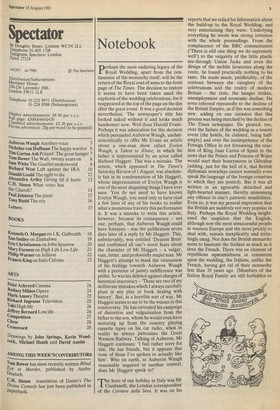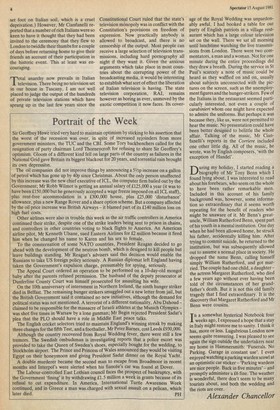Notebook
perhaps the most enduring legacy of the 1 Royal Wedding, apart from the continuance of the monarchy itself, will be the return of the Royal coat of arms to the front page of The Times. The decision to restore it seems to have been taken amid the euphoria of the wedding celebrations, for it reappeared at the top of the page on the day after the great event. It was a good decision nevertheless. The newspaper's title has looked naked without it and looks much handsomer now. Well done Harold Evans. Perhaps it was admiration for this decision which persuaded Auberon Waugh, uncharacteristically to offer Mr Evans an article about a one-man show called Evelyn Waugh, a Talent to Abuse, in which his father is impersonated by an actor called Richard Huggett. This was a mistake. The article, which appeared in The Times's Saturday Review of 1 August, was absolutely fair in its condemnation of Mr Huggett, whose impersonation of Evelyn Waugh is one of the most disgusting things I have ever seen. You do not need to have known Evelyn Waugh, you need only to have read a few lines of any of his books to realise what a monstrous travesty this performance is. It was a mistake to write this article, however, because its consequence — not one, perhaps, that Auberon Waugh could have foreseen — was the publication seven days later of a reply by Mr Huggett. This, unbelievably, was entitled 'Dearest Bron' and confirmed all one's worst fears about the character of Mr Huggett — a vulgar, vain, bitter, and profoundly stupid man. Mr Huggett's attempt to mask the viciousness of his feelings towards Auberon Waugh with a pretence of jaunty indifference was pitiful. So was his defence against charges of historical inaccuracy — 'These are two of my deliberate mistakes which I always carefully plant in any play or book dealing with history'. But, in a horrible sort of way, Mr Huggett seems to me to be the winner in this controversy. He has extended his campaign of distortion and vulgarisation from the father to the son, whom he would even have motoring up from the country playing cassette tapes on his car radio, when in reality he always patronises the Great Western Railway. Talking of Auberon, Mr Huggett continues: 'I feel rather sorry for him. He has friends, but it appears that none of those I've spoken to actually like him'. Who on earth, as Auberon Waugh reasonably inquired in another context, does Mr Huggett speak to?
The hero of our holiday in Italy was Mr Cianfanelli, the London correspondent of the Corriere della Sera. It was on his reports that we relied for information about the build-up to the Royal Wedding, and very entertaining they were. Underlying everything he wrote was strong irritation with the whole proceedings. From the complacency of the BBC commentators (`There is still one thing we do supremely well') to the vulgarity of the little plastic see-through Union Jacks and even the design of the mobile lavatories along the route, he found practically nothing to his taste. He made much, predictably, of the contrast between the vainglory of the celebrations and the reality of modern Britain — the riots, the hunger strikes, unemployment and economic decline. He even referred repeatedly to the decline of the British Empire, as if this was something new, adding on one occasion that this process was being matched by the decline of The Times newspaper. He gloated, too, over the failure of the wedding as a tourist event (the hotels, he claimed, being halfempty) and over the incompetence of the Foreign Office in not foreseeing the reaction of King Juan Carlos of Spain to the news that the Prince and Princess of Wales would start their honeymoon in Gibraltar (adding, just for the hell of it, that British diplomats nowadays cannot normally even speak the language of the foreign countries to which they are posted). But it was all written in an agreeably detached and light-hearted manner, thereby minimising any offence to one's patriotic sensibilities. Even so, it was my general impression that the British are suddenly not very popular in Italy. Perhaps the Royal Wedding heightened the suspicion that the English, although now the most unsuccessful people in western Europe and the most prickly to deal with, remain inexplicably and irritatingly smug. Nor does the British monarchy seem to fascinate the Italians as much as it does the French. There was an element of republican squeamishness in comments upon the wedding, the Italians, unlike the French, having got rid of their monarchy less than 35 years ago. (Members of the Italian Royal Family are still forbidden to set foot on Italian soil, which is a cruel deprivation.) However, Mr Cianfanelli reported that a number of rich Italians were so keen to have it thought that they had been invited to the ceremony that they flew to London to twiddle their thumbs for a couple of days before returning home to give their friends an account of their participation in the historic event. This at least was encouraging.
Total anarchy now prevails in Italian 1 television. There being no television set in our house in Tuscany, I am not well placed to judge the output of the hundreds of private television stations which have sprung up in the last few years since the Constitutional Court ruled that the state's television monopoly was in conflict with the Constitution's provisions on freedom of expression. Now practically anybody is allowed to broadcast, and there is no censorship of the output. Most people can receive a large selection of television transmissions, including hard pornography all night if they want it. Given the anxious arguments which take place in most countries about the corrupting power of the broadcasting media, it would be interesting to establish what sort of effect the liberation of Italian television is having. The state television corporation, RAI, remains however as boring as ever, unmoved by the exotic competition it now faces. Its cover age of the Royal Wedding was unpardonably awful. I had booked a table for our party of English patriots in a village restaurant which has a large colour television set on the wall. There we sat all morning until lunchtime watching the live transmissions from London. There were two commentators, a man and a woman. Not for one minute during the entire proceedings did they draw a breath. During the service in St Paul's scarcely a note of music could be heard as they waffled on and on, usually about subjects unconnected with the pictures on the screen, such as the unemployment figures and the hunger-strikers. Few of the Italians in the restaurant seemed particularly interested, not even a couple of carabinieri whom one might have expected to admire the uniforms. But perhaps it was because they, like us, were not permitted to hear the music. No presentation could have been better designed to belittle the whole affair. Talking of the music, Mr Cianfanelli's reports in the Corriere included one other little dig. All of the music, he wrote, was by English composers, 'with the exception of Handel'.
uring my holiday, I started reading a biography of Mr Tony Benn which I found lying about. I was interested to read about his forebears, who seem on the whole to have been rather remarkable men. Included in this account of his family background was, however, some information so extraordinary that it seems worth repeating for the benefit of readers who might be unaware of it. Mr Benn's greatuncle, William Rutherford Benn, spent part of his youth in a mental institution. One day when he had been allowed home, he struck his father, accidentally killing him. After trying to commit suicide, he returned to the institution, but was subsequently allowed out to assume a normal place in society. He dropped the name Benn, calling himself simply William Rutherford, and got married. The couple had one child, a daughter— the actress Margaret Rutherford, who died a few years ago without ever having been told of the circumstances of her grandfather's death. But it is not this old family tragedy that I find extraordinary. It is the discovery that Margaret Rutherford and Mr Benn were cousins.
I n a somewhat hysterical Notebook four weeks ago, I expressed a hope that a stay in Italy might restore me to sanity. I think it has, more or less. Lugubrious London now seems quite reassuring. I was pleased to see again the sign outside the undertakers near my home in Hammersmith: 'Funerals. No Parking. Garage in constant use'. I even enjoyed watching a parking warden scowl at an optimistic car sticker — 'Parking wardens are nice people. Back in five minutes' — and promptly administer a £6 fine. The weather is wonderful, there don't seem to be many tourists about, and both the wedding and the riots are over.
Alexander Chancellor



































 Previous page
Previous page